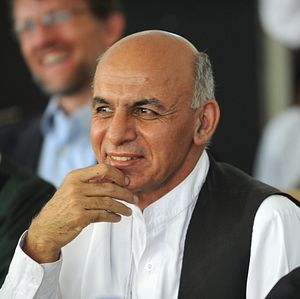If there ever was a time for Beijing and Kabul to open a new chapter in their bilateral relations, it’s now. Afghanistan’s new president, Ashraf Ghani, and his national unity government have been in office for just over a month. U.S. and NATO forces are rapidly withdrawing from the country, leaving behind a considerable security vacuum. Amid this period of great internal change for Afghanistan, it would make sense for China to step in to deepen its partnership with Afghanistan. President Ghani flew to Beijing on October 28 for his inaugural visit abroad and was greeted by Chinese President Xi Jinping at the airport — a sign of the importance China attaches to its relationship with Afghanistan. As the two men speak, their agendas will focus somewhat on separate issues. Ghani will be happy to leave China with promises of investment in hand while Xi is looking for credible signs that Afghanistan’s security situation won’t collapse in 2015 or beyond.
According to an Associated Press report, Ghani’s wish has largely come true. Xi has already promised Afghanistan millions in aid, and will additionally help finance Afghanistan’s burgeoning mining industry — a potential cash cow for a country rising out of over a decade of war. China pledged $330 million in grants to Afghanistan over the next three years, and additionally agreed to provide professional training for 3,000 Afghans. Xi remarked that he was willing to work with Ghani toward “a new era of cooperation in China-Afghanistan relations and take development to a new depth and breadth.” Ghani meanwhile reciprocated the sentiment by signaling that he was entirely on-board with China’s New Silk Road initiative — a bid by Beijing to revive the historical trade route which connected Europe and the Middle East to Asia, with China as its easternmost terminus. “We feel that our vision of Afghanistan as a hub of regional trade, transit, and peace would be an illustration of your vision of East Asia and South Asia cooperation,” Ghani told Xi. Ghani proposed to that end that the two countries work to set up a transport link along their narrow border at the easternmost tip of the Wakhan Corridor, an inhospitable and mountainous region.
In China’s view, every aspect of bilateral relations will be influenced by the security situation in Afghanistan. First, if the government in Kabul is unable to project power to Afghanistan’s far-flung districts, Chinese investment returns there will likely suffer. For example, despite a Chinese state firm signing a $3 billion deal in 2007 for the development of a copper deposit at Mes Aynak, the initiative fell through after the Taliban attacked the project site (Mes Aynak is incidentally not too far from Kabul). The Chinese company ended up pulling its workers out of Afghanistan. Secondly, and perhaps of primary concern to Beijing, is that should the Afghan state fail to keep the Taliban in check, Islamist insurgent groups hostile to Beijing such as the East Turkestan Islamic Movement (ETIM) could continue to regroup in Afghanistan or along the porous Afghanistan-Pakistan border. During a meeting of the two countries’ foreign ministers earlier this year, China explicitly emphasized the ramifications of Afghan instability on the security of China’s restive western Xinjiang province.
Incidentally, the final day of Ghani’s visit to Beijing will coincide with this year’s meeting of the Istanbul Ministerial Process, a regional forum on Afghanistan. China is hosting the meeting for the first time and officials from Azerbaijan, China, India, Iran, Kazakhstan, Kyrgyzstan, Pakistan, Russia, Saudi Arabia, Tajikistan, Turkey, Turkmenistan, the United Arab Emirates and Uzbekistan will participate. With Ghani’s attendance, the conference could go a long way in shaping how the region comes together to support Afghan political stability following the withdrawal of Western troops in the coming months. It remains to be seen if Beijing will leverage its status as host to position itself as a leader for the cause of Afghan political stability in the region.

































